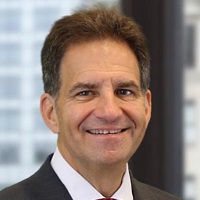Post-Chevron DOGE: Is This the End of Federal Regulation?
The Supreme Court's Chevron decision last year shifted regulatory oversight to Congress. How could that impact the work of Elon Musk and the new DOGE?


Profit and prosper with the best of Kiplinger's advice on investing, taxes, retirement, personal finance and much more. Delivered daily. Enter your email in the box and click Sign Me Up.
You are now subscribed
Your newsletter sign-up was successful
Want to add more newsletters?

Delivered daily
Kiplinger Today
Profit and prosper with the best of Kiplinger's advice on investing, taxes, retirement, personal finance and much more delivered daily. Smart money moves start here.

Sent five days a week
Kiplinger A Step Ahead
Get practical help to make better financial decisions in your everyday life, from spending to savings on top deals.

Delivered daily
Kiplinger Closing Bell
Get today's biggest financial and investing headlines delivered to your inbox every day the U.S. stock market is open.

Sent twice a week
Kiplinger Adviser Intel
Financial pros across the country share best practices and fresh tactics to preserve and grow your wealth.

Delivered weekly
Kiplinger Tax Tips
Trim your federal and state tax bills with practical tax-planning and tax-cutting strategies.

Sent twice a week
Kiplinger Retirement Tips
Your twice-a-week guide to planning and enjoying a financially secure and richly rewarding retirement

Sent bimonthly.
Kiplinger Adviser Angle
Insights for advisers, wealth managers and other financial professionals.

Sent twice a week
Kiplinger Investing Weekly
Your twice-a-week roundup of promising stocks, funds, companies and industries you should consider, ones you should avoid, and why.

Sent weekly for six weeks
Kiplinger Invest for Retirement
Your step-by-step six-part series on how to invest for retirement, from devising a successful strategy to exactly which investments to choose.
Today, acronyms tend to carry more weight than policies. The new Department of Government Efficiency (DOGE) is no different, having set tongues wagging before it was even established. At its helm, Elon Musk seems poised to disrupt what he sees as a bloated regulatory state. But as Musk tweets about ending bureaucracy, a quieter reality is emerging — disruption from the courts may eclipse DOGE’s significance, as federal oversight has already begun shifting.
The Supreme Court's decision last June to overturn the Chevron doctrine, a decades-long girding that underpinned regulatory authority, has rendered the regulatory landscape uncertain. But that uncertainty is not from the regulators. And as DOGE strides in, its purpose and efficacy may already be in question.
The crackdown on regulatory ambiguity
For nearly four decades, the Chevron doctrine allowed federal agencies to interpret ambiguous congressional statutes, with courts deferring to their expertise. This framework empowered agencies to draft and enforce regulations across industries, from environmental standards to labor protections.
From just $107.88 $24.99 for Kiplinger Personal Finance
Become a smarter, better informed investor. Subscribe from just $107.88 $24.99, plus get up to 4 Special Issues

Sign up for Kiplinger’s Free Newsletters
Profit and prosper with the best of expert advice on investing, taxes, retirement, personal finance and more - straight to your e-mail.
Profit and prosper with the best of expert advice - straight to your e-mail.
The Loper Bright Enterprises v. Raimondo case, decided earlier in 2024, centered on whether the Department of Commerce could require fisheries to fund their own on-boat observers. The case put the Chevron doctrine in the cross hairs because the statute did not define where to get the funding, and the Department of Commerce urged the courts to defer to it for interpreting how to regulate the fisheries. The Supreme Court dismantled Chevron. The ruling shifted interpretive authority back to Congress, signaling an end to the era of deference to agency judgment. Ambiguous or indirect mandates from Congress are now targets for legal challenge, threatening, but not yet undoing, the foundation for countless regulations on the books.
The decision sends a clear message: Congress must take responsibility for specificity for an agency to make regulations under an act. But in a legislature marked by partisanship and inertia, even with the Republicans controlling both chambers of Congress, this clarity may be more aspiration than reality.
The DOGE dilemma
DOGE’s founders argue that the Supreme Court’s Chevron decision strengthens their hand. Vivek Ramaswamy, who was initially named DOGE’s co-leader with Musk but has since exited, recently called it a “mandate to dismantle” overreaching federal oversight. Musk echoed this sentiment, heralding DOGE as a solution to regulatory inefficiency.
Yet legal experts suggest the opposite: The ruling may render DOGE’s mission redundant. Executive agencies, including DOGE, have always held the authority to pare back regulations. What Chevron provided was the latitude to enforce them. Regulations will now hinge on Congress stating clear guidance on what new laws do and don’t do — though the institution is notorious for vague statutes and underfunded initiatives.
Ironically, DOGE’s success may depend on a legislative body that often opts for ambiguity over action. Congress has historically relied on agencies to fill in the gaps for loosely worded laws. Post-Chevron, such delegation is untenable. But the shift underway to hold Congress to specify its intent does not reveal any new way for the executive branch to bump off regulations. It could always do that. DOGE’s ambitious plans to streamline and deregulate may prove symbolic rather than substantive.
The implications for industry
Industries are already seizing the opportunity to challenge long-standing regulations. In corporate boardrooms across the country, legal teams are combing through federal rules, prioritizing those without a clear statutory basis.
The potential ripple effects are immense:
- Commoditized industries (sectors like oil and gas) likely driven by cost-cutting could see weakened safety and environmental standards as companies race to the bottom.
- Specialized markets (industries with high barriers to entry) may thrive under self-regulation, using innovation and quality to outcompete rivals.
But self-regulation brings risks. Examples litter history — think pre-2008 financial markets — where deregulation led to drastic consequences.
The new regulatory battleground
The true battle for the regulatory future isn’t at DOGE or in executive agencies; it’s in Congress. Legislative precision and funding are the keys to what regulations will exist and whether they are enforceable.
Take the Paycheck Protection Program (PPP) during the pandemic. Congress crafted a nearly self-executing statute that authorized and funded the Small Business Administration (SBA) to deliver billions in loans with minimal ambiguity. By contrast, the Department of Commerce’s failure to secure ongoing funding for fishery observers set the stage for the Loper case and unraveling Chevron.
The lesson is clear: Specificity in legislation matters. But achieving it requires Congress to overcome its entrenched reliance on broad strokes.
The legacy of DOGE and Chevron
As DOGE embarks on its mission, it will do so in a regulatory environment already reshaped by the courts. The Chevron doctrine, once a pillar for executive authority, is gone. What remains is a more constrained, accountability-focused framework that demands precision from Congress and vigilance from industries.
For DOGE, the irony is inescapable. Its purpose — to streamline federal regulation — was feasible under Chevron and remains feasible now. Not much has changed with executive authority to excise regulations. But the judiciary has shifted the center of gravity from the executive branch to the legislature.
The Supreme Court has opened the door to a less-regulated America. The verdict on whether this new landscape fosters innovation and growth or descends into chaos will depend on Congress’ willingness to adapt and industries’ commitment to responsible governance. In this new era, DOGE may find itself a secondary player, not the protagonist Musk envisions.
For now, the regulatory future lies not in the hands of disruptors or agencies but in the hallowed, often-gridlocked halls of Capitol Hill.
Related Content
- Supreme Court Strikes Down Chevron: What It Means for the IRS
- Unrealized Gains Tax Survives U.S. Supreme Court
- How Four Recent Supreme Court Rulings Impact Your Money
- Two Consequential Tax Cases You May Not Have Heard About
Profit and prosper with the best of Kiplinger's advice on investing, taxes, retirement, personal finance and much more. Delivered daily. Enter your email in the box and click Sign Me Up.

Jon has a well-established litigation career in state and federal courts, as well as pursuing alternative dispute resolution methods such as arbitration on behalf of his clients when the situation warrants. Jon is client-focused while maintaining the highest professional standards. He also serves as Vice Chair of the Firm’s Business Litigation Practice.
-
 Nasdaq Leads a Rocky Risk-On Rally: Stock Market Today
Nasdaq Leads a Rocky Risk-On Rally: Stock Market TodayAnother worrying bout of late-session weakness couldn't take down the main equity indexes on Wednesday.
-
 Quiz: Do You Know How to Avoid the "Medigap Trap?"
Quiz: Do You Know How to Avoid the "Medigap Trap?"Quiz Test your basic knowledge of the "Medigap Trap" in our quick quiz.
-
 5 Top Tax-Efficient Mutual Funds for Smarter Investing
5 Top Tax-Efficient Mutual Funds for Smarter InvestingMutual funds are many things, but "tax-friendly" usually isn't one of them. These are the exceptions.
-
 Nasdaq Leads a Rocky Risk-On Rally: Stock Market Today
Nasdaq Leads a Rocky Risk-On Rally: Stock Market TodayAnother worrying bout of late-session weakness couldn't take down the main equity indexes on Wednesday.
-
 5 Top Tax-Efficient Mutual Funds for Smarter Investing
5 Top Tax-Efficient Mutual Funds for Smarter InvestingMutual funds are many things, but "tax-friendly" usually isn't one of them. These are the exceptions.
-
 Why Invest In Mutual Funds When ETFs Exist?
Why Invest In Mutual Funds When ETFs Exist?Exchange-traded funds are cheaper, more tax-efficient and more flexible. But don't put mutual funds out to pasture quite yet.
-
 Social Security Break-Even Math Is Helpful, But Don't Let It Dictate When You'll File
Social Security Break-Even Math Is Helpful, But Don't Let It Dictate When You'll FileYour Social Security break-even age tells you how long you'd need to live for delaying to pay off, but shouldn't be the sole basis for deciding when to claim.
-
 I'm an Opportunity Zone Pro: This Is How to Deliver Roth-Like Tax-Free Growth (Without Contribution Limits)
I'm an Opportunity Zone Pro: This Is How to Deliver Roth-Like Tax-Free Growth (Without Contribution Limits)Investors who combine Roth IRAs, the gold standard of tax-free savings, with qualified opportunity funds could enjoy decades of tax-free growth.
-
 One of the Most Powerful Wealth-Building Moves a Woman Can Make: A Midcareer Pivot
One of the Most Powerful Wealth-Building Moves a Woman Can Make: A Midcareer PivotIf it feels like you can't sustain what you're doing for the next 20 years, it's time for an honest look at what's draining you and what energizes you.
-
 Stocks Make More Big Up and Down Moves: Stock Market Today
Stocks Make More Big Up and Down Moves: Stock Market TodayThe impact of revolutionary technology has replaced world-changing trade policy as the major variable for markets, with mixed results for sectors and stocks.
-
 I'm a Wealth Adviser Obsessed With Mahjong: Here Are 8 Ways It Can Teach Us How to Manage Our Money
I'm a Wealth Adviser Obsessed With Mahjong: Here Are 8 Ways It Can Teach Us How to Manage Our MoneyThis increasingly popular Chinese game can teach us not only how to help manage our money but also how important it is to connect with other people.